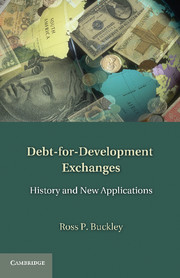Book contents
- Frontmatter
- Contents
- Acknowledgments
- List of Contributors
- Introduction: A Productive Partnership between Civil Society and the Academy
- Part I Types of Exchanges and Their Development over Time
- Part II Exchanges by Donor Countries
- Part III Critiques of Exchanges
- Part IV Innovative Applications of Exchanges
- 15 Farmer-Managed Natural Regeneration: A Land Rehabilitation Technique Well Adapted to Funding by Exchanges
- 16 Restoring Mangroves in the Philippines
- 17 Poverty Reduction through Social Protection: A Potential Form of Debt-for-Development Exchange
- 18 Climate Change Adaptation Exchanges: An Exploration of the Possibilities and Risks
- 19 Climate Change and Food Security: Building Resilience by Means of Climate Field Schools
- 20 Debt-for-Security Exchanges
- 21 Promoting Good Governance through ICT Systems: Improving Transparency and Reducing Corruption
- 22 Using Debt Exchanges to Enhance Public Accountability to Citizens
- Conclusion
- Index
- References
18 - Climate Change Adaptation Exchanges: An Exploration of the Possibilities and Risks
Published online by Cambridge University Press: 01 June 2011
- Frontmatter
- Contents
- Acknowledgments
- List of Contributors
- Introduction: A Productive Partnership between Civil Society and the Academy
- Part I Types of Exchanges and Their Development over Time
- Part II Exchanges by Donor Countries
- Part III Critiques of Exchanges
- Part IV Innovative Applications of Exchanges
- 15 Farmer-Managed Natural Regeneration: A Land Rehabilitation Technique Well Adapted to Funding by Exchanges
- 16 Restoring Mangroves in the Philippines
- 17 Poverty Reduction through Social Protection: A Potential Form of Debt-for-Development Exchange
- 18 Climate Change Adaptation Exchanges: An Exploration of the Possibilities and Risks
- 19 Climate Change and Food Security: Building Resilience by Means of Climate Field Schools
- 20 Debt-for-Security Exchanges
- 21 Promoting Good Governance through ICT Systems: Improving Transparency and Reducing Corruption
- 22 Using Debt Exchanges to Enhance Public Accountability to Citizens
- Conclusion
- Index
- References
Summary
INTRODUCTION
This chapter explores the potential role of debt-for-development exchanges in the context of climate change adaptation. This is a timely contribution. It has become apparent that the sums of money required for adaptation are outside the capacity of existing sources. This context demands innovative thinking about potential mechanisms for financing adaptation to climate change in the coming years. The present chapter has two key purposes. The first, as the title suggests, is to consider the opportunities and risks involved in supporting adaptation through the model of debt-for-development exchange. The second is to explore and interrogate contemporary notions of adaptation through the lens of debt-for-development exchanges.
Adaptation to climate change has received increasing attention over the past few years. It is widely accepted that climate change is already having an impact on vulnerable communities around the globe through adverse weather events and gradual changes. A range of stakeholders now recognise that there is a need to establish financial flows that support adaptation.
In the lead up to the Copenhagen United Nations Framework Convention on Climate Change (UNFCCC) negotiations in December 2009, considerable effort was applied to calculating potential costs for adaptation to climate change. Both government and nongovernmental organisations (NGOs) attempted to estimate what would be required to fund adaptation in the developing world. Estimates ranged from a few billion US dollars per year to more than a hundred billion per year.
- Type
- Chapter
- Information
- Debt-for-Development ExchangesHistory and New Applications, pp. 223 - 235Publisher: Cambridge University PressPrint publication year: 2011
References
- 2
- Cited by



